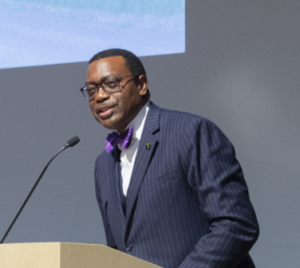The President of African Development Bank Group (AfDB), Dr. Akinwumi Adesina, has projected that Africa would require between $100 billion to $127 billion yearly between now and year 2030 to bridge climate change financing gap in the continent.
The AfDB President, who gave these figures on Monday in his paper delivered at the Africa Climate Adaptation Summit, Rotterdam, Netherlands, explained that providing the fund had become imperative in view of the findings that global warming levels will be reached much earlier in the continent than other parts of the world.
According to him, the effects of the change will be devastating loss of crops, decimation of livestock populations and livelihoods of pastoralists; while child wasting will increase by 37% in West Africa, and 25% in East Africa.
The development finance expert pointed out that a one degree increase in temperature had also been associated with a 11% greater risk of conflict in Africa, as it triggers weather related disasters and conflicts, with 4.3 million Africans already displaced due to climate change.
Adesina said that based on estimates from the AfDB, GDP losses per capita could be as high as 16-64% under high warming scenario.
He explained: “In the face of all this deluge, Africa did not have the resources to tackle climate change as the continent receives only 3% of global climate financing. If this trend continues, Africa’s climate financing gap will reach $100 billion to $127 billion per year through 2030.
“The current climate financing architecture is not meeting the needs of Africa. New estimates by the African Economic Outlook of the African Development Bank shows that Africa will need between 1.3 and 1.6 trillion dollars between 2020-2030, or $118 billion to $ 145 billion annually, to implement its commitments to the Paris Agreement and its nationally determined contributions”, the AfDB President added.
Adesina described the African Adaptation Acceleration Programme (AAA-P) as Africa’s own programme, supported by African Heads of State, to mobilize more resources for climate change, to advance the objectives of the African Adaptation Initiative.
He further disclosed that the AfDB and the Global Center on Adaptation (GCA) were mobilizing $25 billion for the programme, the largest ever climate adaptation effort globally, to which the continent’s development finance institution had already committed $12.5 billion.
Also, the development finance banker said that the AAA-P had an upstream facility at the GCA and a downstream facility at the AfDB which needed $250 million to help to mainstream solutions on climate adaptation, adding that the downstream facility at the Bank, to be capitalized at $1.75 billion, will help leverage additional adaptation finance by a factor of four times, to deliver $7 billion of additional adaptation finance.
He expressed delight that the GCA and the AfDB were already showing very good results on the AAA-P as the programme’s facility at the GCA had helped to generate $3 billion of mainstreamed climate adaptation investments by the development finance institution, from agriculture, to energy, transport, water, and sanitation.
Adesina commended the UK government for its delivery on its promise of GBP 20 million for the upstream facility at the GCA, which has been fully disbursed and estimated that $12.5 billion would be needed for the full financing of the AAA-P.






